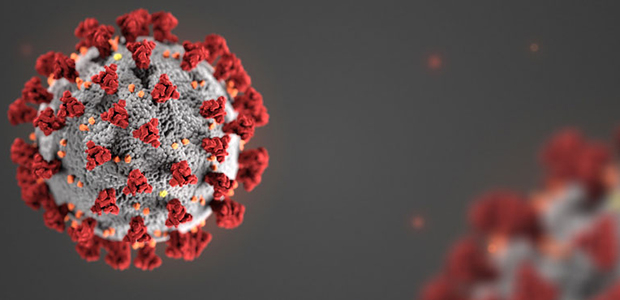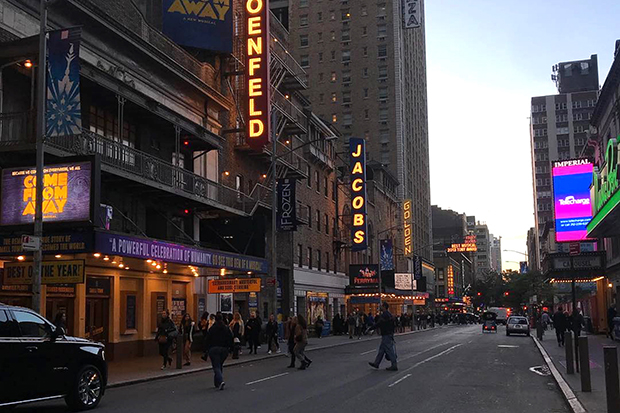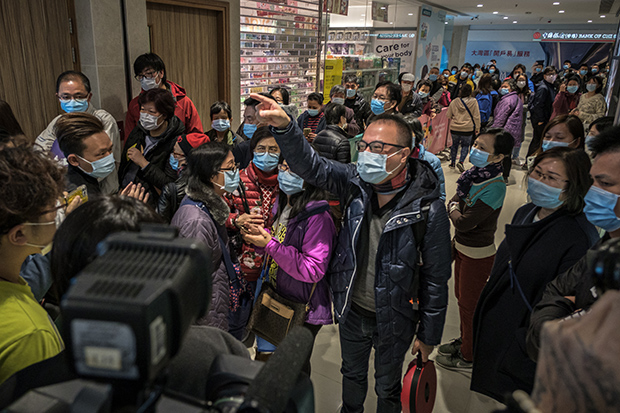Should Fear of Coronavirus Stop You From Going to the Theater?
As coronavirus mania sweeps the nation, New York theater is getting in on the act.

(© David Gordon)
UPDATE (MARCH 12, 2:10 PM): Broadway Expected to Go Dark at 5pm to Combat Coronavirus Pandemic.
UPDATE (MARCH 12, 1:40 pm): Broadway Producers Mulling Full Shut Down Until Easter Amid COVID-19 Concerns.
UPDATE (March 12, 11:50 am): Mayor de Blasio to Announce Broadway Guidelines for Coronavirus Response.
Click here for a complete list of New York City theater postponements and cancellations.
"Let's not shake hands," a veteran Broadway publicist advised the room at a recent press meet-and-greet, noting the mounting panic about the novel coronavirus. And that got us thinking: Beyond eschewing all human contact, what is Broadway doing to prepare for an outbreak of coronavirus?
This Story of the Week will explain what the response has been so far, what it means, and why you shouldn't be looking to theater producers to protect you from infectious disease. But first:

(© CDC)
What is coronavirus?
While the term "coronavirus" can be used to refer to a number of single-stranded RNA viruses, it has been adopted as shorthand this year for "SARS-CoV-2," a virus that causes a disease called COVID-19 (the 19 referring to the year 2019, when it was first documented). The virus was first identified in Wuhan, China, and has since spread to other parts of the world, including Japan, Italy, Iran, and the United States (although the number of cases in these other countries is nowhere near the number documented in China).
Since it is a relatively new disease, a lot is still being discovered about COVID-19, but here is what we do know: It spreads person-to-person through respiratory droplets produced when an infected person coughs or sneezes. When those droplets are inhaled by another person, the virus can potentially infect them.
According to the Centers for Disease Control and Prevention, symptoms of COVID-19 include fever, coughing, and shortness of breath. People are most contagious when they are most symptomatic. The CDC recommends that people with mild symptoms recover at home to prevent the virus from spreading to others. Those experiencing more severe symptoms should call their doctor (rather than just arriving at the office unannounced) to receive instructions about how to seek further medical care.

(© David Gordon)
How have Broadway's leading organizations responded?
Last Thursday, Actors' Equity (the union that represents Broadway performers and stage managers) released the following statement: "We have shared guidance with staff, posted resources for members and are having the appropriate internal conversations about maintaining business continuity if an outbreak becomes more severe. We have also initiated conversations with major Equity employers and other labor leaders around maintaining a safe and healthy workplace. We will continue to monitor the situation, seek guidance and best practices from the appropriate health authorities and share additional information as warranted."
Not to be outdone, the Broadway League (the trade association representing Broadway producers, presenters, and theater owners) grilled up its own nothingburger statement on Monday: "The Broadway League is closely monitoring this evolving situation on behalf of the Broadway community. The safety and security of our theatregoers and employees is our highest priority. We are following the lead of our city, state and federally elected officials, as well as implementing strategies recommended by public health authorities in all of our theatres and offices. We remain vigilant, and we are prepared to make decisions based on current needs, as well as in response to changing conditions."
There doesn't seem to be much of substance in either of those statements, but what were you expecting? If there's a major pandemic in New York City, the Broadway League isn't going to be the organization to solve it. As both statements make clear, this is an issue for government and public health professionals. The best we can do is follow their guidance and try not to be too crazy while doing it.

(© Studio Incendo)
Is everyone just unreasonably panicking?
I'm not an epidemiologist, but I think so. This map created by Johns Hopkins University to track the virus offers a cold look at the facts: So far, there have been roughly 97,000 confirmed cases of COVID-19, resulting in 3,305 deaths (mostly in China). 53,638 people have recovered (also mostly in China). Should you be unfortunate enough to contract this coronavirus, your chances of being in the latter group are vastly higher than the former.
That doesn't mean you shouldn't take the kind of precautions that should frankly already be routine: Wash your hands. And when you haven't washed them recently, try not to touch your face so much. Oh, and that mask you bought at Duane Reade is the facial equivalent of a security blanket: It won't actually protect you from coronavirus and hoarding them comes at the expense of people who actually need them (like doctors). "Seriously people," US Surgeon General Jerome M. Adams recently tweeted, "STOP BUYING MASKS!"
I still intend to go to the theater every night, and will continue to do so until performances are canceled. (UPDATE: Broadway performances have been canceled.) Personally, I don't feel at any greater risk this year than I normally do. As Dr. Lisa Maragakis of Johns Hopkins points out, the flu will infect an estimated 1 billion people worldwide this year, resulting in 291,000 to 646,000 deaths. This happens every year, and it's not a new story, which is why so few reporters are writing about it relative to the coronavirus.
Unless you want to live like Howard Hughes, wandering around the house with tissue boxes for shoes, there is a chance you might get sick this time of year. You always have to assume some level of risk when existing in the world — and that's a risk I'm willing to take to see theater in New York. But should I die in the line of duty, feel free to link back to this story in my obituary. Hubris is, of course, the great fertilizer of tragedy.










